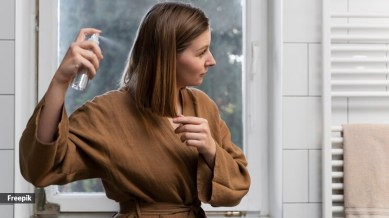📣 For more lifestyle news, click here to join our WhatsApp Channel and also follow us on Instagram
Is ‘skinification’ what you need to maintain healthy hair?
Extending skincare principles to your tresses — this is exactly what skinification is — a trend gaining popularity worldwide due to its personalised and holistic approach to hair care.
- By: Lifestyle Desk
- New Delhi |

Let’s face it — our hair often takes a back seat to the meticulous care we lavish on our skin. However, a recent beauty trend making waves, which involves treating your hair the same way you treat your skin, is being touted as a game-changer. Termed as ‘skinification,’ individuals practicing this trend are realising the importance of extending skincare principles to their tresses.
So, what exactly is skinification of hair?
In simple terms, the skinification of hair revolves around erasing the boundaries between skin and hair care by treating both of them equally, said Dr Monica Bambroo, head of dermatology and cosmetology at Artemis Hospital, Gurgaon.
“Skinification of hair is all about going beyond the conventional practices of sticking to just shampoo, conditioner, and hair mask, and doing a lot more to have healthy hair. As per this concept, hair and scalp need to be treated as an extension of the skin,” she added.
In this practice, the emphasis is on keeping a healthy scalp as the foundation for good hair. “Skincare products, such as serums and masks, are tailored for use on the hair and scalp to address specific needs like hydration, exfoliation, and environmental stressor protection,” said Dr DM Mahajan, senior consultant in dermatology at Indraprastha Apollo Hospital, Delhi.
Why is this trend gaining popularity?
According to Dr Seema Oberoi Lall, consultant in dermatology at CK Birla Hospital, Gurugram, the surge in popularity can be attributed to the influence of social media platforms. “In an age where YouTube tutorials offer a treasure trove of transformative hair rituals and selfies flood our feeds, individuals are increasingly drawn to experimenting with their locks.”
The boom of skinification also stems from a desire to have a more personalised and holistic approach to hair care. “As people prioritise self-care and well-being, expanding skincare ideas to hair care is a logical step. The availability of novel hair care products inspired by skincare formulations adds to the trend, providing remedies for specific hair and scalp conditions. Overall, customers demand a more comprehensive approach to hair care that goes beyond standard shampoo and conditioning routines,” said Dr Mahajan.
Here are the steps you can follow to incorporate skinification into your hair care routine:
Scalp analysis: Begin by assessing your scalp’s specific needs. Identify concerns such as dryness, oiliness, dandruff, or irritation.
Gentle cleansing: Use a sulfate-free and gentle shampoo to cleanse your scalp and hair. Avoid harsh chemicals that can strip the scalp of natural oils.
Exfoliation: Integrate an exfoliating scalp treatment to remove dead skin cells and promote a healthier scalp environment. This step can help with issues like dandruff.
Serums and treatments: Apply hair serums or treatments with ingredients tailored to address your specific scalp and hair concerns. Look for products containing ingredients like hyaluronic acid for hydration or antioxidants for protection.
Massage: Incorporate scalp massages into your routine to stimulate blood circulation and promote nutrient absorption. This can be done with your fingertips or specialised scalp massage tools.
Hydration: Use hydrating masks or deep-conditioning treatments to nourish both the scalp and hair. Ingredients like argan oil, aloe vera, or shea butter can provide moisture and improve overall hair texture.
Sun protection: Protect your scalp and hair from the sun’s harmful UV rays by using hair products with built-in sun protection or wearing a hat when exposed to direct sunlight.
Balanced diet: Support scalp health from within by maintaining a balanced diet rich in vitamins and minerals essential for hair growth. Include foods with biotin, vitamin E, and omega-3 fatty acids.
Regular trims: Schedule regular hair trims to prevent split ends and maintain overall hair health. This supports the skinification approach by promoting strong and vibrant hair.
Consultation with professionals: If you have specific concerns or conditions, consult with a dermatologist or trichologist for personalised advice and treatment options.
Which skincare ingredients can you add to your hair care?
Dr Mahajan lists the following:
- Hyaluronic acid, known for its moisturising properties, can alleviate dryness and maintain a balanced moisture level.
- Salicylic acid helps exfoliate the scalp, removing dead skin cells.
- Argan oil or vitamin E, rich in antioxidants, serves as a protective barrier against environmental aggressors.
- Aloe vera gel is recognised for its soothing and moisturising characteristics.
- Vitamin C hair serums promote collagen formation.
- Shampoos containing niacinamide (vitamin B3) help thicken hair and heal the scalp, preventing hair thinning and scalp sensitivity.
- Peptide-infused hair masks provide nourishment and repair, boosting hair vitality.
- Sunscreen is an essential component for protecting hair from UV radiation.
- Gentle micellar water cleansers and retinol-infused hair products help stimulate cell turnover.
It’s important to ensure that you don’t randomly use any product on your scalp. “Use only those products that suit you and help you in getting rid of the hair and scalp problems,” said Dr Bambroo.
📣 For more lifestyle news, click here to join our WhatsApp Channel and also follow us on Instagram